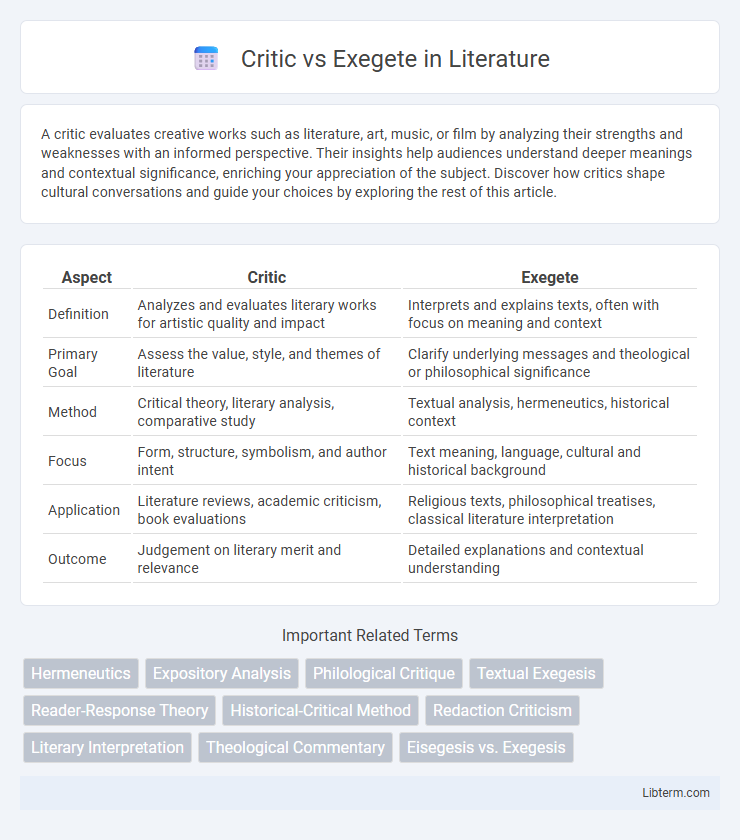A critic evaluates creative works such as literature, art, music, or film by analyzing their strengths and weaknesses with an informed perspective. Their insights help audiences understand deeper meanings and contextual significance, enriching your appreciation of the subject. Discover how critics shape cultural conversations and guide your choices by exploring the rest of this article.
Table of Comparison
| Aspect | Critic | Exegete |
|---|---|---|
| Definition | Analyzes and evaluates literary works for artistic quality and impact | Interprets and explains texts, often with focus on meaning and context |
| Primary Goal | Assess the value, style, and themes of literature | Clarify underlying messages and theological or philosophical significance |
| Method | Critical theory, literary analysis, comparative study | Textual analysis, hermeneutics, historical context |
| Focus | Form, structure, symbolism, and author intent | Text meaning, language, cultural and historical background |
| Application | Literature reviews, academic criticism, book evaluations | Religious texts, philosophical treatises, classical literature interpretation |
| Outcome | Judgement on literary merit and relevance | Detailed explanations and contextual understanding |
Understanding the Roles: Critic and Exegete
A critic evaluates literary or artistic works by analyzing their style, structure, and impact, often providing subjective judgments based on aesthetic or cultural criteria. An exegete specializes in interpreting texts, particularly religious or philosophical writings, aiming to uncover original meanings through contextual and linguistic analysis. Understanding their roles reveals that critics focus on evaluative commentary, while exegetes seek deeper comprehension and explanation of textual content.
Historical Origins of Criticism and Exegesis
Criticism and exegesis both trace their origins to ancient scholarly traditions, with criticism emerging in classical Greek philosophy as a method of evaluating texts and ideas, while exegesis originated within religious contexts, particularly in Jewish and Christian scriptural interpretation. Early critics like Aristotle analyzed literary works to assess style and meaning, whereas exegetes focused on unraveling divine intent and theological significance from sacred scriptures. The historical distinction lies in criticism's broader evaluative approach contrasted with exegesis's specialized theological and linguistic analysis.
Key Objectives: Analysis vs Interpretation
Critics focus on the objective analysis of texts, emphasizing structural elements, historical context, and factual accuracy to evaluate the work's authenticity and craftsmanship. Exegetes prioritize interpretation, seeking to uncover deeper meaning, theological significance, and intended messages within the text. The key objective for critics is rigorous assessment, while for exegetes it is insightful understanding.
Methodological Approaches Compared
Critics analyze texts by applying evaluative standards and interpretative frameworks to assess meaning, coherence, and cultural significance, often employing deconstruction or psychoanalytic methods. Exegetes focus on systematic, contextual interpretation based on historical, linguistic, and theological methodologies to elucidate authoritative meanings within sacred or canonical texts. While critics emphasize subjective analysis and theoretical critique, exegetes adhere to rigorous hermeneutic principles to uncover intended messages and doctrinal truths.
Tools and Techniques in Criticism and Exegesis
Critics employ tools such as textual analysis, historical context evaluation, and theoretical frameworks like structuralism and postmodernism to interpret literature and art. Exegetes utilize techniques including close reading, linguistic analysis, and hermeneutics to uncover the intended meaning of texts, especially religious or classical works. Both disciplines rely on critical methodologies but differ in purpose: critics analyze and evaluate, whereas exegetes explicate and interpret.
Literary Criticism vs Scriptural Exegesis
Literary criticism analyzes texts by examining themes, structures, and stylistic elements to interpret meaning and cultural context. Scriptural exegesis specifically focuses on interpreting sacred texts through historical, theological, and linguistic lenses to uncover religious doctrines and messages. While literary critics explore artistic expression and author intent, exegetes prioritize understanding divine revelation and doctrinal consistency within scripture.
Common Misconceptions about Critics and Exegetes
Critics are often mistaken for merely finding faults in texts, while exegetes focus on interpreting and understanding the meaning within a specific context, especially religious or historical works. Many people conflate the roles, assuming both analyze texts similarly, but critics evaluate literary quality and style broadly, whereas exegetes delve deeply into textual origins and intended messages. This misunderstanding overlooks the exegete's scholarly need to consider linguistic, cultural, and historical factors, contrasting with a critic's broader analytical perspective.
The Interplay Between Criticism and Exegesis
Criticism and exegesis engage in a dynamic interplay where criticism evaluates textual interpretations while exegesis seeks to uncover the original meaning within biblical or literary texts. Critical analysis employs various methodologies--including historical, textual, and literary criticism--to challenge or support exegetical conclusions, ensuring interpretations remain accurate and contextually grounded. This interaction fosters deeper understanding by balancing objective scrutiny with interpretative insight, advancing scholarly discourse in theology, literary studies, and hermeneutics.
Notable Figures: Critics and Exegetes in History
Notable critics in history such as Harold Bloom and Roland Barthes have advanced literary analysis through interpretive frameworks that challenge traditional readings, emphasizing deconstructive and psychoanalytic approaches. Prominent exegetes like St. Augustine and Philo of Alexandria provided foundational biblical interpretations, blending theology with historical context to elucidate sacred texts. The interplay between critics and exegetes has shaped intellectual discourse by balancing analytical skepticism with doctrinal clarification.
Impact on Modern Scholarship and Interpretation
Critics influence modern scholarship by challenging traditional interpretations, fostering diverse analytical frameworks that question established narratives and encourage interdisciplinary approaches. Exegetes contribute by providing detailed textual analysis and context, ensuring interpretations remain grounded in historical, linguistic, and cultural accuracy. Together, their combined methodologies enhance the depth and rigor of contemporary interpretation in literary and religious studies.
Critic Infographic

 libterm.com
libterm.com